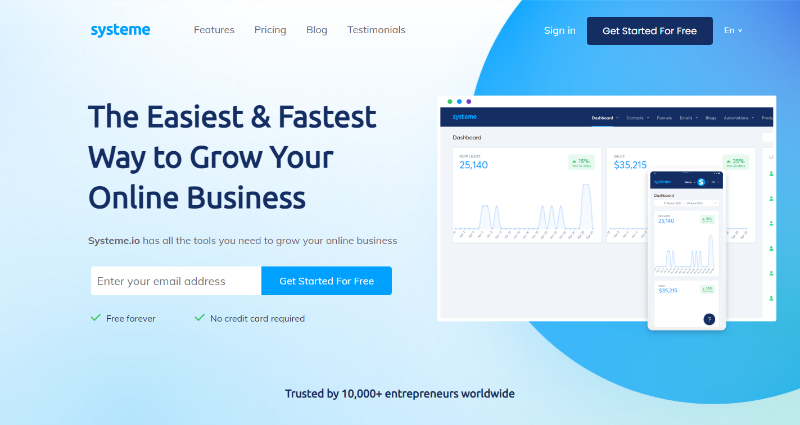Always on the hunt for ways to grow his financial and insurance advisory firm, Ken Greene recently turned to a less conventional form of marketing: He started a podcast.
With just under 20 episodes released, the audience for the Engineer of Finance is growing and attracting inquiries from prospective clients across the country. “It might be one of the best things I’ve done marketing wise,” he says.
Real small business owners share how this untraditional form of marketing worked wonders for them.
Greene’s success isn’t an accident. Podcasts are becoming a valuable part of a small business marketing strategy. Here are seven reasons your business may want to consider launching a podcast:
More than one-third (39%) of owners of SMBs listen to podcasts, and 65% listen at least weekly, according to a survey by small business research firm Bredin. Listenership increases with company size, as Bredin’s survey found that 70-72% of owners of businesses with 100 to 500 employees are tuning in.
“If you’re a business in an industry that has a high customer value, then a podcast may be one of your most effective education and marketing tools,” says Spencer Shaw, founder of the podcast production firm PodKick Media. “I find podcasts work great in the legal, financial, and business services industries. It can work in other industries, like real estate, where the show is representing a geographic area or high-end services or products.”
Greene says one of his strengths is being “very good one-on-one with clients, and very good with education.” But he can’t do hundreds of one-on-one consultations with prospective clients every week. Instead, the podcast allows him to reach that many listeners—and more. Those who are interested in his approach to building wealth can then reach out to him “on their time frame,” he says.
“You can’t demonstrate your credibility without sharing your expertise, and by sharing your expertise you become helpful. You become valuable for your listeners,” explains Stephen Woessner on his podcast Onward Nation, a daily podcast for business owners. “It’s much more likely you can then develop a business relationship from someone in your audience when you’ve established your credibility.”
Marketers frequently wrestle with “churn”—clients who fail to stick around. “A podcast is especially valuable in industries where churn is expensive, and where the customer lifetime value is high,” says Shaw. “Many of our clients say that the podcast isn’t the largest driver of leads; however, it is the best education platform (beating video).”
Greene recently spoke to a listener who had listened to all his episodes before contacting him—a marketer’s dream. Prospects may not listen to your podcast every week, but if you build a following, many will come back again and again, deepening the relationship. According to Shaw, “Prospects and clients come prepared and require less hand-holding, making the onboarding process faster.”
Anyone who starts a podcast will tell you it can be a lot of work. But, in reality, as the host, the only thing you have to do is show up and talk. Depending on your time and interests, you can outsource everything from booking guests, editing, publishing, transcription, show notes, and promotion. Greene outsources his production to Shaw’s company, PodKick, for example. “All I have to do is speak,” he says.
Woessner, who has also written Profitable Podcasting: Grow Your Business, Expand Your Platform, and Build a Nation of True Fans, launched his first episode just 30 days after he came up with the idea—and went on to launch podcasts for clients shortly after.
Other Articles From AllBusiness.com:
You can start a podcast with just a mic and hosting. Shaw’s favorite mic is the ATR 2100, which currently costs less than $70 on Amazon. “Podcast hosting is about $20 a month, and that’s the total cost if you are doing all the editing and production yourself,” he says. Shaw adds that professional services that can take tasks off your to-do list can start at just $500 a month, depending on how often you publish and how much assistance you require.
Onward Nation is listened to worldwide and has generated $2 million in revenues. In his book Profitable Podcasting, Woessner attributes his success in large part to his “Trojan horse” method of selling, where he is able to get in front of industry leaders and key decision makers by interviewing them on his show, a strategy any podcaster can emulate.
In addition to bringing in leads and sales—which can be reason enough to start one—a podcast can become a source of additional revenue through sponsorships. “You’ve attracted an audience that other companies (non-competing of course) will want to pay you … to get in front of,” explains Woessner.
Above all, hosting a podcast can be work you look forward to. You get to meet and interview interesting guests, and you can connect with listeners you may not have heard from any other way. “Every week I look forward to my podcast,” says Greene. “I love sharing stories and ideas that can make a huge difference financially for listeners.”
RELATED: 10 Business Podcasts Every Entrepreneur Should Be Tuning In To
This article was originally published on AllBusiness.com. Read all of Gerri Detweiler’s articles.
